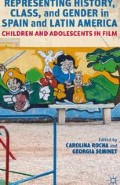Abstract
Argentine filmmaker Lucía Puenzo’s movie XXY (2007) stands apart from a long line of other fictional and philosophical works concerned with intersexed characters. In contrast to works that use “the hermaphrodite” as a trope for an original unity of the sexes, decadence, or degeneration, the film focuses on the lived experience of a concrete intersexed adolescent raised as a girl.1 By tracing five days in the life of 15-year-old Alex and her family on a sparsely populated Uruguayan island, Puenzo constructs a complex vision of an intersexed character portrayed not as a metaphor but as a material being in relation with others.2 Throughout this process, the director propagates ideals that have been defended by intersex activists in Argentina and the United States. XXY disputes the need for genital surgeries at birth, objects to the naturalization of culturally contingent sexual binaries, and contends that intersexed individuals should be allowed to decide the destiny of their bodies for themselves.
Access this chapter
Tax calculation will be finalised at checkout
Purchases are for personal use only
Preview
Unable to display preview. Download preview PDF.
Works Cited
Benjamin, Jessica. Like Subjects, Love Objects: Essays on Recognition and Sexual Difference. New Haven: Yale UP, 1995.
—. Shadow of the Other: Intersubjectivity and Gender in Psychoanalysis. New York: Routledge, 1997.
Butler, Judith. Gender Trouble: Feminism and the Subversion of Identity. 2nd ed. New York: Routledge, 1990.
Butte, George. I Know That Yo u Know That I Know: Narrating Subjects from Moll Flanders to Marnie. Columbus: Ohio State UP, 2004.
Cabral, Mauro. “Como la que más.” XXY: La película. Web. 20 Feb. 2010 <http://www.puenzo.com.xxylapelicula/main.html>.
—. “Pensar la intersexualidad, hoy.” XXY: La película. Web. 20 Feb. 2010 <http://www.puenzo.com/xxylapelicula/main.html>.
Cabral, Mauro, and Paula Viturro. “(Trans)sexual Citizenship in Contemporary Argentina.” Transgender Rights. Ed. Paisley Currah, Richard M. Juang, and Shannon Minter. Minneapolis: U of Minnesota P, 2006. 262–73.
Derrida, Jacques. “Force of Law: The ‘Mystical Formation of Authority’.” Deconstruction and the Possibility of Justice. Ed. Drucilla Cornell, Michel Rosenfeld, and David Gray Carlson. New York: Routledge, 1992. 3–67.
Epstein, Julia. Altered Conditions: Disease, Medicine, and Storytelling. New York: Routledge, 1995.
Frohlich, Margaret. “What of Unnatural Bodies?: The Discourse of Nature in Lucía Puenzo’s XXY and El niño pez/The Fish Child.” Studies in Hispanic Cinemas 8.2 (2011): 159–74.
Kaplan, E. Ann. “Is the Gaze Male?” Feminism and Film. Ed. E. Ann Kaplan. Oxford: Oxford UP, 2000. 119–38.
Karkazis, Katrina Alicia. Fixing Sex: Intersex, Medical Authority, and Lived Experience. Durham: Duke UP, 2008.
Laine, Tarja. Shame and Desire: Emotion, Intersubjectivity, Cinema. Bruxelles: Lang, 2007.
Maffía, Diana, and Mauro Cabral. “Los sexos: ¿Son o se hacen?” XXY: La película. Web. 20 Feb. 2010 <http://www.puenzo.com/xxylapelicula/main.html>.
Mayer, Sophie. “Family Business.” Sight and Sound 18.6 (2008): 14.
Medak-Seguín, Bécquer. “Hacia una noción de lo traumático queer: XXY de Lucía Puenzo.” Nomenclatura: aproximaciones a los estudios hispánicos 1.1 (2011): 1–23. Web. 13 Mar. 2012 <http://uknowledge.uky.edu/cgi/viewcontent.cgi?article=1001&context=naeh>.
Mulvey, Laura. “Visual Pleasure and Narrative Cinema.” Feminism and Film. Ed. E. Ann Kaplan. Oxford: Oxford UP, 2000. 34–47.
Puenzo, Lucía. “XXY Director Lucía Puenzo Conducts Q&A, NY Premier (Part 3).” YouTube. Web. 5 Mar. 2010. <http://www.youtube.com/watch?v=sYg7Ak4JuAA&NR=1>.
Stadler, Jane. Pulling Focus: Intersubjective Experience, Narrative Film, and Ethics. New York: Continuum, 2008.
Williams, Gary. “Speaking with the Voices of Others.” The Hermaphrodite. By Julia Ward Howe. Ed. Gary Williams. Lincoln: U of Nebraska P, 2004. ix–xliv.
XXY. Dir. Lucía Puenzo. Perf. Inés Efron, Ricardo Darín, and Martín Piroyansky. Film Movement, 2007. Digital videodisc.
Editor information
Copyright information
© 2012 Carolina Rocha and Georgia Seminet
About this chapter
Cite this chapter
Zamostny, J. (2012). Constructing Ethical Attention in Lucía Puenzo’s Xxy . In: Rocha, C., Seminet, G. (eds) Representing History, Class, and Gender in Spain and Latin America. Palgrave Macmillan, New York. https://doi.org/10.1057/9781137030870_11
Download citation
DOI: https://doi.org/10.1057/9781137030870_11
Publisher Name: Palgrave Macmillan, New York
Print ISBN: 978-1-349-44061-0
Online ISBN: 978-1-137-03087-0
eBook Packages: Palgrave Media & Culture CollectionLiterature, Cultural and Media Studies (R0)

